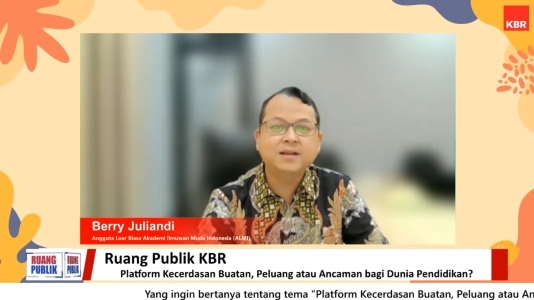Dr Berry Juliandi Responds to ChatGPT Trends and Challenges in Education

The trend of artificial intelligence (AI) has begun to explore various platforms. One that is often discussed lately is ChatGPT, which was released in November last year. This technology is said to be able to help humans complete various literacy tasks, such as answering questions and writing text. Its presence has a big impact on education.
Dr. Berry Juliandi, Dean of the Faculty of Mathematics and Natural Sciences (FMIPA) IPB University explained that from a neuroscience perspective, AI has both positive and negative impacts. As a machine capable of making decisions and solving problems, AI can be utilized for various fields.
"AI can increase knowledge, knowing how the human brain works which can be sorted out through AI components. For example, the process of cognition and memory work," he explained in the KBR Public Space Talkshow on the topic 'Artificial Intelligence Platform, Opportunity or Threat for Education' (02/03).
"In addition, AI can be used to find treatments for various neurological diseases such as depression, anxiety, alzheimer's by analyzing brain activity and looking for patterns related to the disease," he added.
Actually, he continued, AI can improve human cognitive and physical abilities. Negatively, its use can cause dependence and even create fake news or misinformation. According to him, the brain development of children who have been exposed to technology in cognition will be more advanced. Cognitive abilities are higher, the reactive time of spatial visual abilities is high, and the ability to solve problems is higher. Early stimulation by technology will make the brain network more developed.
"Digital communication skills will be higher. However, direct social communication will decrease if not trained. Attention skills are also lower," he said. Children can be invited to play in nature such as fishing, contemplating, reading books while chatting without gadgets to reduce the negative impact. This method can offset the negative impact while improving children's social skills.
"Coupled with good time management and limiting yourself from using gadgets at certain times," he explained. He added that the advantages of individuals who have often been exposed to AI will make children more capable of solving complex problems. In addition, the ability to make decisions is higher with predictions and information assistance from AI. Their digital literacy is also high because they can use AI effectively.
"Job opportunities are also higher because now the industry has begun to adopt AI in its business processes. So it requires human resources with high technological literacy," added the IPB University lecturer from the Biology Department. He explained that individuals exposed to AI also have strong trust in technology. Technology is always relied upon in problem solving. In addition, it will be easier to adapt to technological developments in the future.
As for education, he said, the right time to introduce AI to students depends on the goal. If the outcome is to become an expert in the field of AI, from an early age, children's activities are associated with the concepts of logic, data analysis and prediction through games. This ability is enhanced from middle school to college through the knowledge of making AI-based application algorithms.
However, he said, the challenges for students and educators due to the presence of AI, especially ChatGPT, are also diverse. The use of AI has potential for education related to empathy and social interaction. Educators need to be more creative to organize activities and tasks related to AI technology and social interaction.
"By giving tasks based on social activities, the use of ChatGPT will be minimal. The use of ChatGPT can be used to test and invite students to read and repeat material without realizing it," he said. (MW/Zul) (IAAS/ARD)


